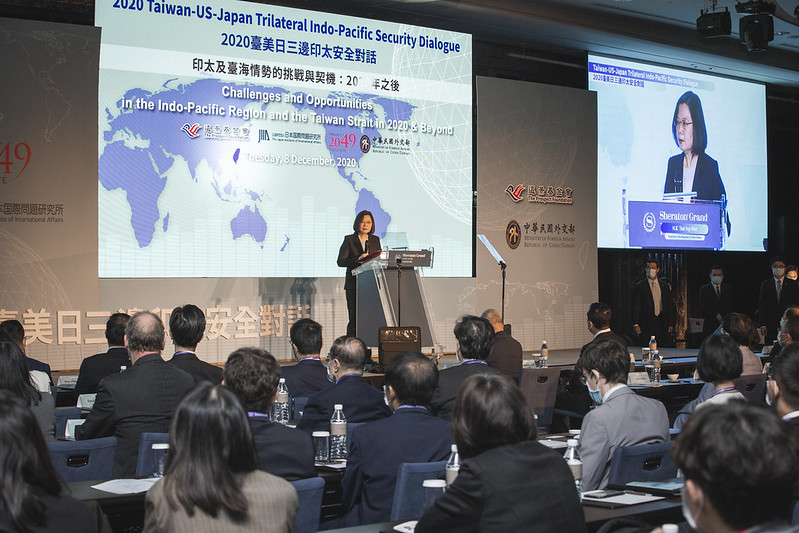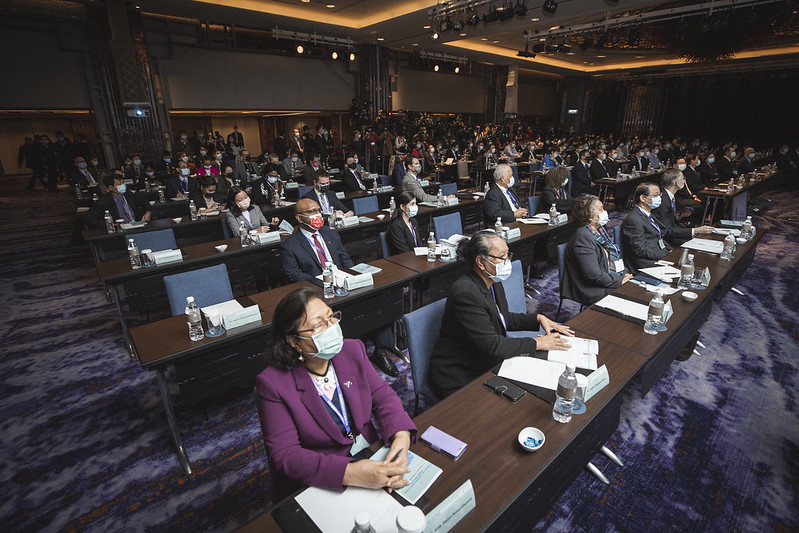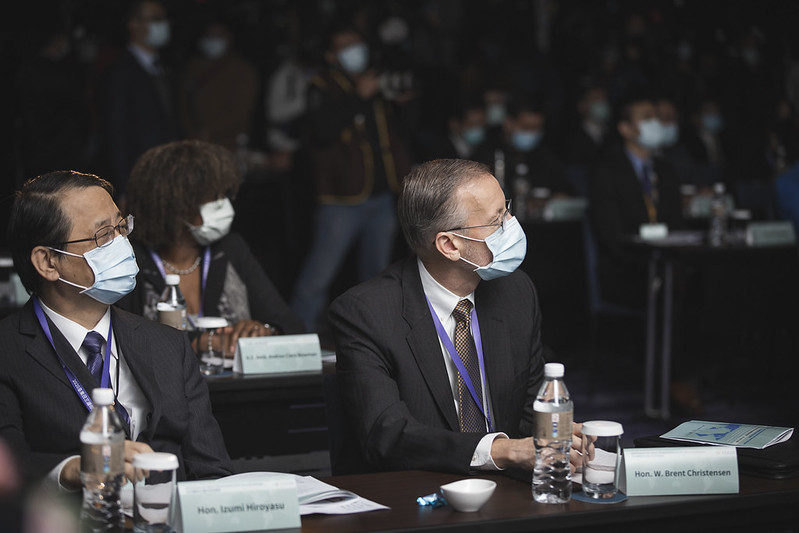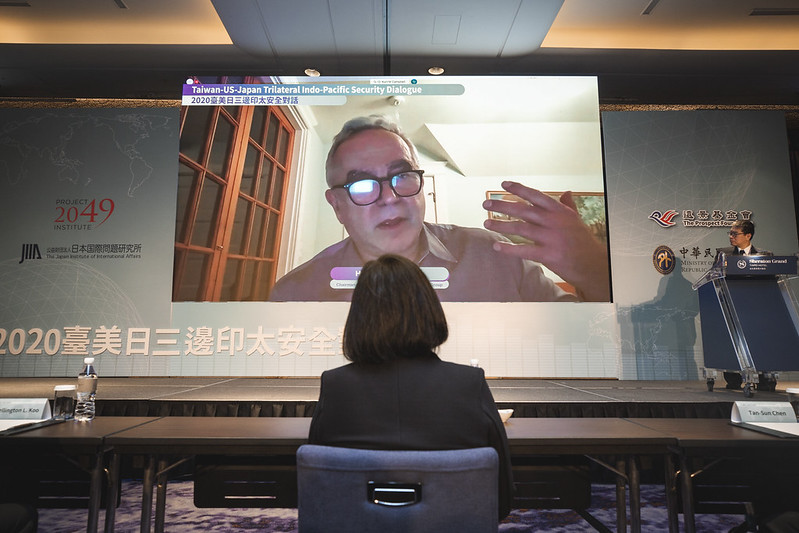News & activities
 News releases
News releases
While attending the opening ceremony of the 2020 Taiwan-US-Japan Trilateral Indo-Pacific Security Dialogue on the morning of December 8, President Tsai Ing-wen stated that in the face of the COVID-19 pandemic, Taiwan is ready and prepared to help those in need. She also expressed hope for working together to tackle the threats and challenges that beset our region and the world through trilateral engagement and strengthening mutually beneficial partnerships.
A transcript of President Tsai's remarks follows:
Before I begin, I would like to take this opportunity to thank the Project 2049 Institute, the Japan Institute of International Affairs and the Prospect Foundation for their hard work in making this important conference possible. I also want to thank former Assistant Secretary of State, Kurt Campbell, for joining us today. It has been a while since we last saw each other. I am happy to see you looking well and in good health. I very much look forward to listening to your talk.
As I have said before, 2020 has been a challenging year for everyone, with humanity facing unprecedented hurdles caused by the COVID-19 pandemic. The global economy has experienced a continuous downturn, and the way we think and live has changed forever. Critical events such as the pro-democracy movement in Hong Kong and the US presidential election, meanwhile, will significantly influence how we deal with geopolitics in our region in the future. The recent imprisonment of three young Hong Kong democracy activists serves as a stern reminder that we are once again presented with a fundamental decision to make, that is: we either defend democracy, or we surrender to the threat of authoritarianism.
But 2020 has also been a year of warmth, resilience, strength, and friendship. Despite the pandemic, Taiwan continued to welcome old and new friends, and formed partnerships with like-minded allies, particularly the United States, Japan, and the Czech Republic. This year has been riddled with trials and tribulations, but it has also allowed us to form and strengthen mutually beneficial partnerships. This is also why this year's trilateral security dialogue is crucial. Only through engagement and by working together can we tackle the threats and challenges that beset our region and the world.
While the COVID-19 pandemic kept us occupied, other forms of traditional and non-traditional threats also posed grave challenges. The South China Sea has become increasingly militarized. And authoritarian forces consistently attempt to violate the existing rules-based order. Taiwan has been at the receiving end of such military threats on a daily basis. We therefore understand the urgency of dealing with these threats. In addition, non-traditional threats such as natural disasters, international crime, threats to energy safety, maritime and cyber security, also need to be effectively addressed.
This year, we are commemorating the fifth anniversary of GCTF — the Global Cooperation and Training Framework. GCTF is a unique platform through which Taiwan and the US have set up workshops to train officials and experts to address non-traditional security and emerging global issues. Taiwan has also established a regional humanitarian assistance and disaster relief network under the GCTF umbrella. So when natural disasters occur, Taiwan and its regional partners are prepared to help.
Over the past five years, a total of 29 GCTF workshops have been held to address issues and challenges in public health, energy safety, women's empowerment, and media literacy. More than 1,500 experts, officials and participants from more than 60 countries have attended the GCTF workshops. This year is also the first time we organized GCTF workshops on important topics such as pandemic prevention, the circular economy and marine debris disposal. We are actively working to expand GCTF in the near future.
I am also very pleased that Japan became a full partner of GCTF last year. Sweden, Australia and the Netherlands also joined as issue-specific partners. The governments and people of Taiwan and Japan have supported and encouraged each other during natural and man-made disasters. I was happy to learn that the Taiwan-Japan Exchange Foundation has named 2021 the "Japan-Taiwan Friendship Year." We look forward to an even closer partnership with Japan in our efforts to address traditional and non-traditional threats.
This year, Taiwan's Ministry of Foreign Affairs established a task force to serve as the GCTF Secretariat. It also founded a GCTF Alumni Network to facilitate connections and reunions for former participants. I firmly believe that institutionalizing GCTF will help it become a hub for regional cooperation, particularly over non-traditional security issues that threaten countries in the Indo-Pacific. Leveraging expertise and capabilities, Taiwan and its like-minded partners in the region can effectively address the challenges ahead.
Taiwan has accomplished quite a lot since the outbreak. We have done this without tarnishing what we treasure most – and that is our democratic system and way of life. I also understand that it is difficult to simply replicate a country's experience, as every country has its uniqueness and faces its own challenges. But, I must reiterate here, that Taiwan is ready and prepared to help those in need. The COVID-19 pandemic allowed us to witness the fragility of life and to understand the importance of mutual assistance. There is a possibility that we might face yet another outbreak. But, regardless of how daunting the future challenges are, the international community can always count on us.
Let me conclude by saying that throughout our history, we were consistently confronted by great challenges. But we have always been able to triumph by working together and believing in our shared-values of freedom and democracy. I wish you all a successful dialogue and a wonderful holiday season. I hope we can welcome all participants to Taiwan next year, and that, of course, includes you, Kurt.
Also in attendance were Prospect Foundation Chairman Mark Chen (陳唐山), National Security Council Secretary-General Wellington Koo (顧立雄), Foreign Minister Joseph Wu (吳釗燮), and National Security Bureau Deputy Director General Ko Cheng-heng (柯承亨).












